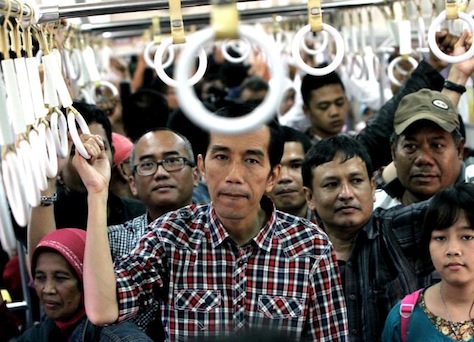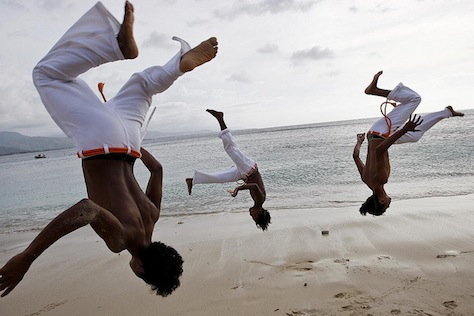His Javanese fans call him the ‘Barack Obama of Indonesia.’![]()
At age 53, the reformist Jakarta governor, Joko Widodo – or ‘Jokowi’ (pictured above)– is very likely to become Indonesia’s next president, with reliable ‘quick counts’ giving him a margin of around 52% to 48% for his rival, former Suharto-era general Prabowo Subianto in the country’s fiercely contested presidential election.
Though the final vote won’t be announced until July 22, leaving Indonesia in a two-week state of semi-uncertainty, the ‘quick count’ results from a half-dozen reputable institutions are generally consistent, they were reliable indicators of the final vote results in Indonesia’s April legislative elections, and they have been reliable indicators in past national elections. Oxford University’s Kevin Fogg, an expert on Indonesia, writes that Jokowi’s ‘quick count’ margin places him safely beyond the realm of ‘dirty tricks, challenges, or underhanded moves,’ despite Prabowo’s alternative declaration of victory, on the basis of less reputable counts from Prabowo-friendly media.
Indonesia, with nearly 247 million citizens, is the world’s fourth-most populous country, the world’s third-largest democracy, Asia’s fifth-largest economy, and it’s an important strategic and trading partner for China, the United States and Australia.
Jokowi’s apparent victory will be welcomed in Washington, Brussels and Canberra because it gives Indonesia a modern leader whose principles are firmly rooted in Indonesian democracy, not Suharto-era authoritarianism. It will also be welcomed among investors in New York, London, Shanghai and Jakarta, who feared that his rival Prabowo’s protectionist and nationalist rhetoric could endanger foreign capital, Indonesia’s rule of law and the steady political, legal and economic gains of the past decade under outgoing president Susilo Bambang Yudhoyono.
A victory for Indonesia’s democratic institutions
Prabowo, Suharto’s former son-in-law, spent parts of the campaign disparaging the idea of ‘one person, one vote,’ and called into question whether ‘Western-style’ democracy was an incredibly good fit with Indonesian values. He waxed about restoring Indonesia’s 1945 constitution, which would have rolled back direct presidential elections and would more easily allow the president to suspend Indonesia’s legislature on the basis of ‘emergency rule.’ Investigative journalist Allan Nairn, who covered the East Timorese struggle against Indonesian rule, published excerpts from a 2001 interview with Prabowo in which the former general argued that Indonesia wasn’t ready for democracy because it still had ‘cannibals’ and ‘violent mobs.’ Though Prabowo ultimately tried to assure voters of his respect for the democratic process in the 2014 campaign, and though he was Megawati’s running mate in her failed 2009 presidential campaign, Prabowo consistently deployed rhetoric reminiscent of Indonesia’s first two authoritarian leaders, the communist Sukarno and the anti-communist Suharto. Continue reading What Jokowi’s apparent victory in Indonesia means

